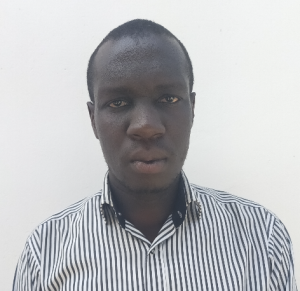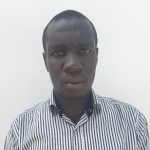When looking at the photos of Ebubere Primary School, you might notice that the school already has a well. But the photos don't tell the whole story. As the photos suggest, the 662 students and staff members of the school do have access to a well, but it does not reliably provide sufficient, safe, clean water. Their unprotected, hand-dug well provides only dirty water, as evidenced by one look at the water's brown, murky color.

Students normally arrive at school by 6:30 a.m. each morning so they can collect water from the dug well, but the water discharge is slow, which inevitably delays the morning lessons for everyone. The contaminated water only gets dirtier the longer students pump, and as you can imagine, drinking it leaves students and school staff feeling ill and suffering from water-related illnesses like stomach and typhoid.
"When students and staff of the school use the water from the protected dug well, they suffer from typhoid, which affects the normal operation of the school," said 52-year-old teacher Roselida Makokha (shown below).

More serious issues present themselves when digging deeper into the truth about the current well. One of the greatest concerns is that the surrounding soil is unstable, so each time people stand near the well, it is at serious risk of collapsing. During the dry season each year, when the well dries up, students must collect water from a faraway spring, which consumes much of their time and energy. The waterpoint is also shared with many community members, and students are often told repeatedly that they must go to the back of the line by adults who prefer to go first.
Sometimes to avoid waiting in long lines to collect water, the students bring what water they can manage to collect from home instead, but that means they reach the school already tired and unable to fully concentrate during their lessons.
"I walk for long distances so that I can collect water for drinking and cooking in school. This makes me miss some classes, and also, when I come back from the spring, I am tired and cannot concentrate while the teacher is teaching," 15-year-old Melkzadick A. (shown below) said.

Hopefully, with a new, safer well that will provide protected, sufficient water to meet the needs at Ebubere Primary School, students will be able to get back to class and use their free time for other things instead of laboring to collect water.
What We Can Do:
New Well
We conducted a hydrogeological survey at this school, and the results indicated the water table beneath it is an ideal candidate for a borehole well. Due to a borehole well's unique ability to tap into a safe, year-round water column, it will be poised to serve all of the water needs for this school's large population, even through the dry season.
The school will help collect the needed construction materials such as sand, rocks, and water for mixing cement. They will also provide housing and meals for the work team, in addition to providing local laborers. We will complement their materials by providing an expert team of artisans and drilling professionals, tools, hardware, and hand-pump. Once finished, the school’s students and staff will use water from the well for drinking, handwashing, cooking, cleaning, and much more.
The school and we strongly believe that all of these components will work together to improve standards at this school, which will help lead to better student academic performance and unlock the opportunity for these students to live better, healthier lives.
Handwashing Stations
The student health club will oversee two new handwashing stations we will provide and ensure they are kept clean and in working condition. The club leaders will fill the handwashing stations with water daily and make sure they are always supplied with a cleaning agent such as soap or ash.
VIP Latrines
Two triple-door latrine blocks will be constructed with local materials that the school will help gather. Three doors will serve the girls, and three doors will serve the boys. These new latrines will have cement floors designed to be easy to use and clean. And with a new well right on school property, there should be enough water to keep them clean.
Training on Health, Hygiene, and More
We will hold a one-day intensive training session with students, teachers, and parents. This training will cover a wide range of topics, including disease transmission routes and prevention; personal and environmental hygiene; and the operation and maintenance of the borehole, latrines, and handwashing stations. There will be a special emphasis on handwashing.
Our team of facilitators will use various methods to train, including participatory hygiene and sanitation transformation and asset-based community development. We will initiate a student health club, which will prepare students to lead other pupils into healthy habits at school and home. We will also lead lectures, group discussions and provide illustrative handouts to teach health topics and promote good hygiene practices within the school, including handwashing and water treatment. We will then conduct a series of follow-up training before transitioning to our regularly scheduled support visits throughout the year.
We and the school strongly believe that all of these components will work together to improve standards at this school, which will help lead to better student academic performance and will help unlock the opportunity for these students to live better, healthier lives.

 Borehole Well and Hand Pump
Borehole Well and Hand Pump
 Rehabilitation Project
Rehabilitation Project

































